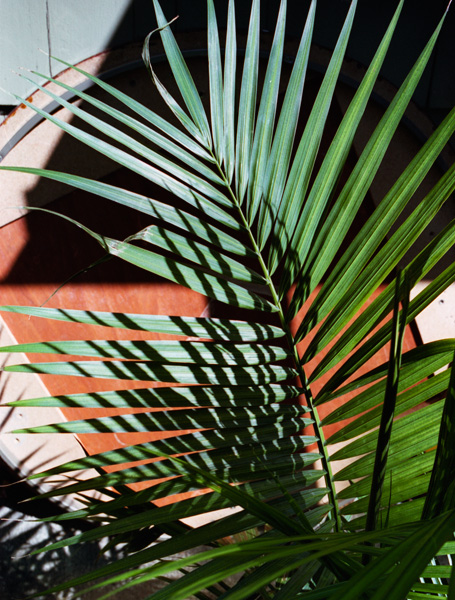
Disclosure: Clayton Cotterell and I are good mates. I once made this *cake* for him on his birthday.
Tell us a bit about your new series Arrangements.
First of all, Arrangements needs a proper title, but it’s a work in progress so I suppose it’ll do for now. In Arrangements I’m referencing the current language of photography of post-productions, studio practices and manipulations. It’s definitely a trend and it is a shift that has opened the door for a lot of people to experiment. We’re seeing a lot of the same imagery. Lots of patterns and fabrics, and mirrors to create something – props that are about perception and optics.
But I’m looking for naturally occurring abstractions. Arrangements is basically an old school approach to new school imagery. I’m recognizing moments [of light, color and form] when they happen in real life. I’m interested in photography that is out in the real world. I mean, taking a moment and making it into a two-dimensional image, that’s always seemed abstract to me.
When you talk of current studio experiments are we thinking of photography such as that of Jessica Eaton or Georg Parthen?
My friend Sarah Palmer won the Aperture prize. Sarah is doing constructions in the studio. Her work looks at signs in visual language. I am interested in these signs and symbols and contemporary visual language but finding these things out in the real world.
When I was in SVA grad school, if anyone shot straight photographs, people were really concerned that it would be placed within the realm of documentary. In a lot of people’s eyes, the straight photograph isn’t artistic like it once was. Paul Graham’s essay The Unreasonable Apple is really important; he’s the most interesting photographer dealing with straight photographs and with sequencing.



You have a particular relationship to nature?
I’m a rock climber so my connection is direct and physical. I’m in awe of towering cliffs and the sublime nature of mountains. I don’t know whether it’s dumb to talk about climbing. Is it that interesting?
I think so. You spend weekends on rock faces. You don’t spend all your time chasing photographs.
It’s easy to get burnt out about something if you obsess over it constantly, especially if you want to keep it going all your life.
I’ve been taking pictures since I was 14 and even then I was serious about making a good photograph. Now, photography is part of who I am and what I do, but I’m not constantly doing it.
Why do you go climbing?
I can’t get the high any other way. I like aggression but I don’t like aggression put on me by someone else. I like pulling hard on a hold and using my muscles. Doing something that is scary but I don’t have to worry about anyone else injuring me. It’s not like wrestling or football.
And photography? Fun or bruising?
The best thing for me is when I start working on an image and figure, ‘Yes, there’s something here.’ I do love having exhibitions, putting something together and having it on the wall. It can be laborious and frustrating but when it’s on the wall it is super rewarding.
The pace that you’re working at, it seems like photography fits in between all the other stuff in life.
At this point in my career, I don’t feel pressure to be producing tons of work. I have no gallery. I have no expectations set upon me except from myself.
I go in waves of producing a lot and then looking at what I’ve done. I’ve been fairly consistent with shooting for the last year and I feel good about it. That’s where the new language comes into play. I don’t think I can have a deadline with my photography. I only know it when I see it.
That’s refreshing, no?
I’ve been studying photographs for a long time and I’m interested in new images. I can see something and know what focal length I want to shoot it at before I even pick my camera up.
I need to change my environments pretty often to find new things. I’ll walk around the neighborhood just to get my eye going but I rarely get something. Being in new places help, which is another reason why I really like photography. You have to be in the place at the time to make the picture. I could never work in a studio.
How do you characterise the Portland photo scene?
The Portland photo scene has a lot going for it and I’ve really only been exposed to what I assume is a small portion. Many of the photographers I’ve met I’ve known about for some time – Shawn Records, Teresa Christiansen, Corey Arnold.
I’ve only been here a year but already feel like I have a strong community of peers. In terms of the gallery scene, I think it’s growing. Spaces like Ampersand Gallery & Fine Books are indicative of a new sensitivity to fine art and vernacular photography praxis here in Portland.




Leave a comment
Comments feed for this article